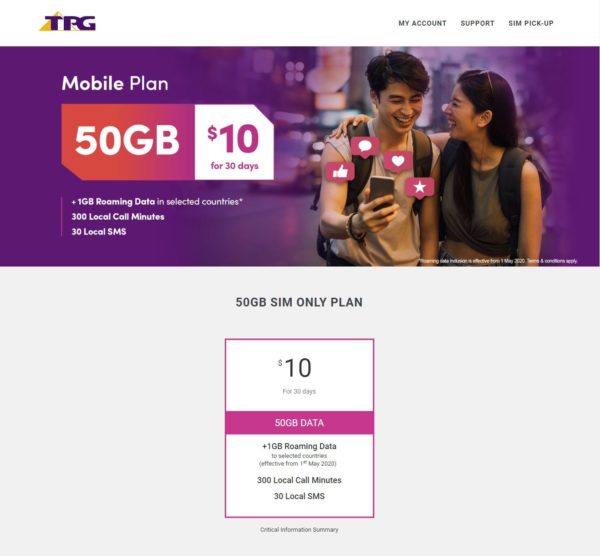
TPG Telecom launched a 4G mobile service in Singapore today that costs just S$10 a month for 50GB of data, offering an attractive deal to consumers but bringing into question the sustainability of the ongoing price war in the country’s telecom market.
The no-contract plan also provides 300 minutes of local calls and 30 local SMSes, making it the most generous of offerings in a market that has already seen unprecedented competition in the past three years.
The new service comes more than three years after the Australia-based telecom operator won the bid to be the fourth player in the Republic, joining Singtel, StarHub and M1.
Before the commercial service today, it had delivered a free trial to 400,000 users since December 2018. They can now sign up for the new deal to become full customers, the company said today in a conference call with reporters.
The bad news for TPG is that in the time it has taken to launch its 4G service, rivals have already engaged in a costly price war that has dragged profits down and fuelled talk of consolidation.
Now that it is in the race, TPG has had to deliver a service at rock-bottom prices that are hard to increase in future. Unless it expands to other services, such as those for corporate customers, it is hard to see this S$10-a-month deal recouping the costs it has paid out so far.
Even if it wins as much as 10 per cent of the more than 9 million subscriptions in Singapore in the first year, that would be 900,000 subscriptions multiplied by S$10 a month. In other words, S$9 million a month or S$108 million a year.
That revenue – not profit – just about covers the S$105 million that TPG paid for the licence to operate in Singapore in 2016. There are also the network and other operating costs that could quickly bring into question how sustainable the strategy is.
Quizzed on this, TPG Singapore’s acting chief executive officer, Richard Tan, said the telco is looking to be profitable in the long term.
However, he would not be drawn into sharing market share targets or further plans down the road that could bring in more revenue for the company.
How well the company does in the future depends partly on whether it can win one of the two nationwide 5G licences from the government regulator in the coming months.
If it does so, it could be in a pole position in the long term to challenge the Big Three incumbents. However, there would be a costly price to pay for a spanking new 5G network just as it is starting to recoup what it had splashed out for a 4G one.
If it loses out, it could still be a virtual 5G player by licensing the network from the two winners, which would be Singtel and a StarHub-M1 consortium. It could still do battle on the 4G front and have a foot in the 5G market without a huge outlay, especially at an inopportune time now.
In both scenarios, however, the challenges are steep. There are no low-hanging fruit anymore, at least not in the consumer space, where the market is highly saturated.
TPG Singapore could follow the recent route of StarHub and M1 by offering, say, Internet of Things (IoT) connectivity to corporations, but it would be fighting a formidable Singtel that has been in that corporate space years earlier.
Plus, for enterprises and business customers, you cannot just turn up and offer a plain, dumb pipe. You have to put a solution around the network. That takes time and talent to deliver.
For now, TPG’s best bet appears to be gaining enough momentum by broadening its market share. Its S$10-a-month consumer plan is easy to understand and will tempt some users to switch from what’s in the market, typically a S$20 service that offers about 20GB to 30GB.
Incidentally, MyRepublic tried to crash the party today by launching a similar S$10 plan, though it offers only 6GB for that price and throttled-down speeds afterwards. Perhaps it knows something that TPG doesn’t.
In the short term, consumers appear to be in for some good deals. However, some might be wary that the current situation may not be sustainable in the long term.
Earlier this month, Zero Mobile, an Australia-based virtual operator that promised cheap unlimited data plans, was suspended and blacklisted by the Singapore regulator over outstanding billing disputes with customers. It had left the market abruptly in December 2019.
TPG appears to be in firmer financial footing, going by the investment it has put into building a nationwide 4G network. However, independent tests have shown a lack of coverage in underground tunnels and MRT stations, calling into question the quality of its service.
Asked about this, TPG’s Tan said that the company is on track to meet the government regulator’s requirements for islandwide coverage.
That could be an important factor that consumers increasingly look for. Even if a service is cheap, a good connection is a minimum requirement.






